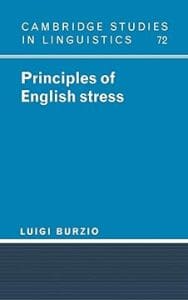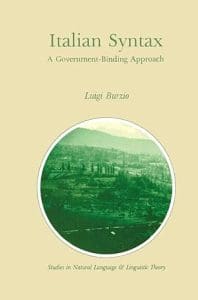
Luigi Burzio
Professor Emeritus
Contact Information
Research Interests: Theoretical phonology, morphology, and syntax; romance linguistics
Education: PhD, Massachusetts Institute of Technology
My Ph.D. dissertation (MIT, 1981) and my Italian Syntax (Kluwer, 1986) were focused on the argument structure of verbs, and helped establish the hypothesis (known as the "unaccusative hypothesis") that the apparent subject of certain verbs (like fall, exist) is in fact the object in argument structure. One of the factual observations made in that work later became known in linguistics as "Burzio's generalization".
The latter work was cast within the general theory of syntax developed by N. Chomsky, which had downplayed the rules (or “transformations”) in favor output constraints since the mid 1970's, while work in phonology had remained rule-based. In the late 1980s, I sought to prove that the constraint-based approach was needed in phonology as well, offering radical re-analyses of English word stress and vowel length alternations, which ultimately resulted in my Principles of English Stress (Cambridge, 1994). This proposed shift within phonology substantially converged with the independently developed “Optimality Theory” of Prince and Smolensky (1993).
Also in the late 1980s, and into the 1990's, I addressed the general theory of pronominal coreference, identifying several hierarchies that appear to hold cross-linguistically and which require the use of ranked constraints in this domain as well, again as in Optimality Theory.
In work of the late 1990s and early 2000s, I argued that mental representations are themselves sets of mini-constraints, that I referred to as “Entailments” (Representational Entailments Hypothesis) based on the observation that representations act as “attractors” to their neighbors in multi-dimensional space.
Selected Publications
Burzio, Luigi (1981). Intransitive Verbs and Italian Auxiliaries. Ph.D. Dissertation, distributed by MIT Working Papers in Linguistics: mitwpl@mit.edu.
Burzio, Luigi (1986). Italian Syntax: A Government-Binding Approach, Reidel, Dordrecht (xiii+468 pp.).
Burzio, Luigi (1991). 'The Morphological Basis of Anaphora'. Journal of Linguistics 27.1, 1-60.
Burzio, Luigi (1993). 'English Stress, Vowel Length and Modularity'. Journal of Linguistics, 29.2, 359-418.
Burzio, Luigi (1994). Principles of English Stress, Cambridge University Press.
Burzio, Luigi (1996). 'Surface Constraints versus Underlying Representation', in: Durand, Jacques and Bernard Laks (eds.) Current Trends in Phonology: Models and Methods. European Studies Research Institute, University of Salford Publications. (123-141)
Burzio, Luigi (1996). 'The Role of the Antecedent in Anaphoric Relations', in R. Freidin, ed. Current Issues in Comparative Grammar, Kluwer, Dordrecht, 1-45.
Burzio, Luigi (1998). 'Anaphora and Soft Constraints', in Pilar Barbosa, Danny Fox, Paul Hagstrom, Martha McGinnis, and David Pesetsky, eds. Is the Best Good Enough? Optimality and Competition in Syntax MIT Press and MIT Working Papers in Linguistics.
Burzio, Luigi (1998). 'Multiple Correspondence'. Lingua 103, 79-109.
Burzio, Luigi (2000). 'Cycles, Non-Derived-Environment Blocking, and Correspondence'. in Joost Dekkers, Frank van der Leeuw and Jeroen van de Weijer, eds. Optimality Theory: Phonology, Syntax, and Acquisition. Oxford University Press, 47-87.
Burzio, Luigi (2002). 'Surface-to-Surface Morphology: when your Representations turn into Constraints', in P. Boucher (ed.) Many Morphologies, Cascadilla Press.
Burzio, Luigi (2002): 'Missing Players: Phonology and the Past-tense Debate'. Lingua 112, 157-199.
Burzio, Luigi (2005). 'Sources of Paradigm Uniformity', in Laura J. Downing, T. A. Hall, Renate Raffelsiefen, eds. Paradigms in Phonological Theory. Oxford: Oxford University Press: 65-106.
Wayment, Adam, Luigi Burzio, Donald Mathis, Robert Frank (2007) 'Harmony versus Distance in Phonetic Enhancement', in Emily Elfner and Martin Walkow (eds), Proceedings of NELS 37. GLSA Publications, Amherst. MA.

